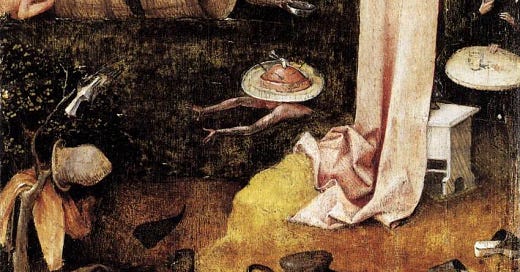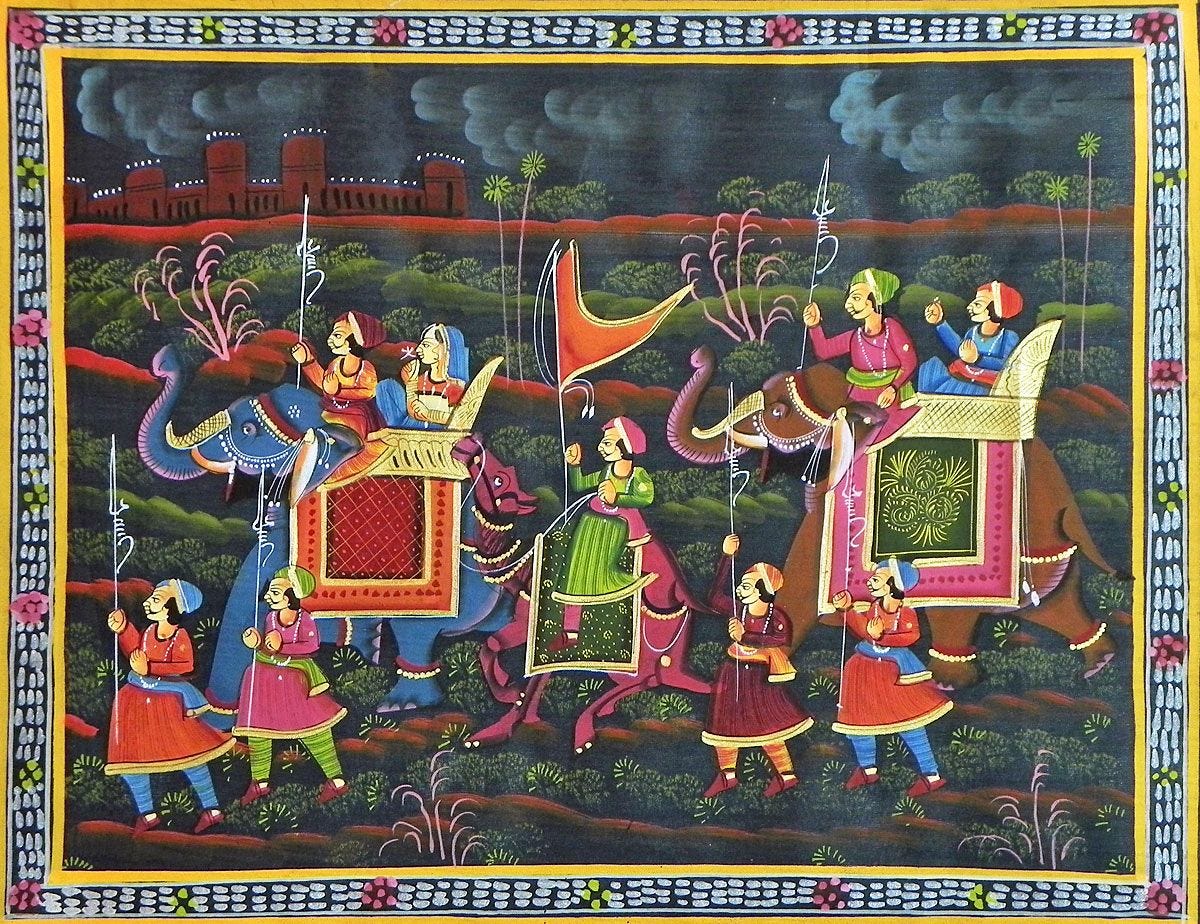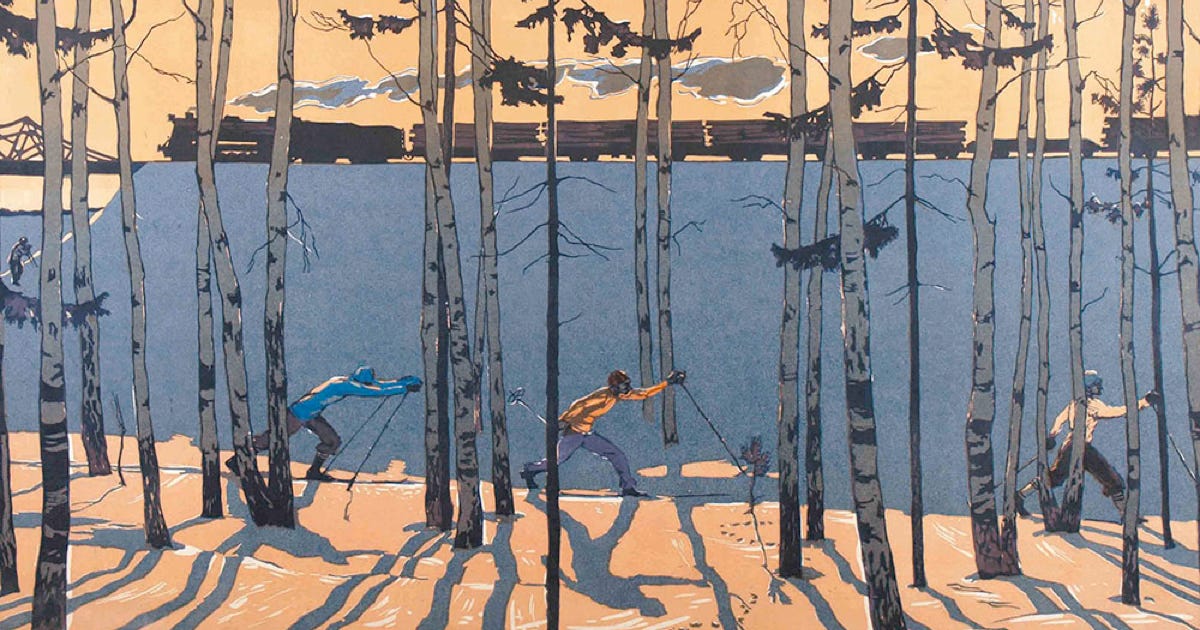Mason & Dixon - Part 1 - Chapter 16: Allegory of Intemperance
Analysis of Mason & Dixon, Part 1 - Chapter 16: The Cheese-Rolling Festival, Lusting After Susannah Peach, Saved by Rebekah, Back at Sandy Bay, Mason Leaves Maskelyne
Having just expressed his grief and regret to Dixon (1.15), Mason thinks it best to tell him a story of his and Rebekah’s meeting. Dixon insisted that Mason does so in order to move past his grief and Mason agrees, though what we are about to see is anything but the truth. Mason’s white lie is said to serve to protect Rebekah — though what that means is up for debate. Could they have met in unfavorable circumstances, or was the real story something that could lead to her unfavorable remembrance? And given he is telling this story to overcome his grief, does this mean he will tell an allegorical or symbolic version of what really happened? Or is he actually just attempting to appease Dixon and make him think that he is taking his advice? At this point in the story, the best bet we can guess is that it is the symbolic version of the truth, meant to disguise any negative representation of the two while still holding true to reality.
In his past, Mason (according to his version of this story) desired to see the annual cheese rolling festival which included, this year, the ‘Octuple Gloucester:’ a food item so immense in scale that one can’t help but think Pynchon is again commenting on excess and gluttony. Mason is pinning this desire on himself and the community he is in. We see this often today in restaurants and on television where immense proportions of food are served up either because the general population believes they need them, because increased portion sizes are an easy means to increase profit, or even just as a challenge. And often these portions go largely uneaten, sometimes even to the extent that the creation of this ‘meal’ was done only for the spectacle and not for any consumption at all. It is a bit of a ridiculous way to represent this sin,1 but what Mason is attempting to do is to place the blame of this gluttonous desire on those like himself and his people, while using Rebekah as a savior of sorts — or, at least the antithesis to all of this consumption. We see the cheese given its own housing, awed over and gossiped about, and even treated as a holy idol. Few things in town attract that sort of respect and attention despite being the embodiment of a Deadly Sin in a land that preached unapologetic devotion to God. But really, whenever have the so-called evangelists held to their word to a tee if it began to impede on their day-to-day pleasures?
Alternatively, one could perceive this gluttony as not being the fault of majority in participation of it. Like Pirate with his banana breakfasts, sometimes we resort to potentially problematic pleasures in order to make lighter of surrounding events. And other times, this gluttony (or these sins) are driven into us over time by the rulers of the land in which we live, and now we use them as a means to bond with those we are closest to, or even those we may have never had much of a chance to meet. You can’t blame the average person for going out to restaurants and bars and occasionally overindulging with friends and family, so while we can criticize the outcome or root of these desires, we cannot criticize the average participants. Similarly, we cannot fully critique the people participating in the contest Mason has come to see.
All this to say, Mason’s use of the cheese allegory is meant to critique this societal trend, but also one of his own very specific desires. In this case, the reality is that he was not actually here to see the festival, but to see Susannah Peach: daughter of Samuel Peach and future wife of James Bradley. We have heard about their fling not long ago while Mason, shortly after Dixon’s departure, discussed many topics with Maskelyne (1.13). During their discussion, Mason had a remembrance of his reading letters for Bradley, and during this reading, he had also remembered his jealousy of the man. Susannah Peach was taken from him (or at least that is what Mason believed). Though his remembrance of this ‘theft’ was not only because he loved Susannah (which he did) but also because losing her compounded the continual attacks on his status; he would always lose something to someone more powerful than him, be it the job of Astronomer Royale to Maskelyne or a lover to James Bradley.
Here, however, back at the festival, Mason also seems somewhat conscious that his desire is not just love or lust, but fetishization. To him, she is the ‘Silk Heiress’ — the beautiful woman who has traveled to lands, learned of foreign trades, and could teach him of things he has never known. Not to mention that her father, Samuel, was a growing power in the EIC, being a reputable silk trader which could be Mason’s path to greatness. So, he does not remember scenes of them meeting, of them talking about their lives at the dinner table, of first ‘I-love-yous.’ Instead, he pictures her wrapped in the silk from faraway lands and stereotypically foreign scenes moving through his mind like a zoetrope: “Savage flowers of the Indies, demurer Blooms of the British garden, stripes and tartans” (169). Picturing this, he stuffs his face in her silks to smell her. He is drawing in what he pictures her as — fetishizing where she comes from and what her potential could be — instead of loving or even lusting after her as an individual.
All of Mason’s gluttony and lust comes to a head when the symbolic representation of these sins breaks free of its reins. The Octuple Gloucester rolls down the hill on a natural path to take the lives of those who overindulge in its evil draw; similarly, one day, this unchecked gluttony will be the thing that tramples us and leaves us for dead. But while Mason is ready to accept his fate (or at least is too shocked that his desires would lead to his demise to do anything about it), his life is saved by someone he has never met: Rebekah. If she is his literal savior, she is his symbolic one as well. Her mere presence removes the acute lust he holds for Susannah and the unceasing gluttony he has to consume. She tempers his intemperance. Or, if not that, at least leads him to realize the existential threat that these sins hold over him and the Earth.
But this is only how he wants Rebekah to be remembered. Because recall that at the beginning it was stated that Mason wanted Rebekah to only be remembered in the most shining light. It is also clear, however, that his desire for her to be remembered well is because he believes that she was that shining light which reminded him that a lack of temperance would lead to his, and the world’s, demise. And here, with an interjection at the LeSpark’s house, Uncle Ives provides further evidence of the story’s fictitiousness when he states that “There are no records of [Rebekah] in Gloucestershire” (171). Ives, being a brother of J. Wade LeSpark, is not simply doing this to maintain historical accuracy. Instead, he wants to ensure that the coming generations do not perceive this allegory as something to live by or to give merit to. The LeSpark family will continue to profit from humanity’s desire to indulge in sex, war, and all the spoils of imperialism. So, Mason placing Rebekah on high for defeating (or attempting to defeat) this desire would only ever harm that plot.
She is all of that to Mason and more. Here, no longer in the story being told to Dixon but back upon Saint Helena2 as a ghost, her mere presence reveals to him the evil that these sins and desires bring upon this world: “Wages too low to live upon, Laws written by Owners, Infantry, Bailiffs, Prison, Death’s thousand Metaphors in the World” (172). Overproduction and overconsumption mean we must hire more and more workers for more and more hours. With an increase in labor hours comes an increase in the potential for profit, raising greed and glut. Laws are therefore written not by those who would most benefit from a lawful society, but by those who own these people’s wages. Infantry enforces further forced labor across the globe. Bailiffs and police officers protect the property and the ‘rights’ of these Owners. Prisons confine any Preterite so brave to break these laws. All these metaphors of death stem from something as ridiculous as a massive block of cheese, rolling down the hill in all its unnecessary enormity, ready and willing to crush anything beneath its rind.
Interestingly, through all of Mason’s oscillations between the spiritual and the material, Rebekah reminds him of something. Yes, sometimes it is beautiful to believe “that the Stars were Souls departed” (172). And yes, a person can find more solace in life by realizing one’s inherent spiritual connection with the natural world. But nonetheless, she reminds him to “Look to the Earth,” not to that which is “outside of Time” (172). Look to your fellow man, not to the stars. While the spiritual realm can tether us and humble us, the material is what will push us forward to our freedom.
In a tent, Maskelyne awakes next to Mason after feeling a breeze that he believes to be Dieter, the German patrolman on Sandy Bay who only wished to be relieved of his post (1.15). Mason gets the idea that Dieter could have been a ghost just like Rebekah. And since Mason had never seen Dieter just as no one but Mason has seen Rebekah, could Dieter be Maskelyne’s own ghost of reason? — an entity attempting to show Maskelyne the horrors of the world and asking him to fix them? But whereas Mason listens to the call of the spirits and attempts to change his ways because of them, Maskelyne only hears them.
The ever-present wind on Sandy Bay was the never-ending progress of Empire always blowing relentlessly onward. Mason here, however, “has begun in recent days hearing in the Wind entire orchestral Performances, of musick distinctly not British,— Viennese perhaps, Hungarian, even Moorish” (173). This altered his reading of the Wind into something new: instead of the never-ending progress of Empire, it is the never-ending progress of history. And with history, we do not only have one possibility: we have endless. The wind is the orchestral representation of the endless possibilities that could possibly exist. For example, which specific Empire may take the reins, when will Empire no longer exist, at what time certain Empires may fall once or fall for good. Both that and the stories told about them, because as we can clearly see already, history happens, but how it is told is a whole other story.
Mason realizes that despite Maskelyne’s prescience and keen perception of the systemic corruption and evil of the system, all it is is prescience and perception. He appears completely unwilling to take action or to listen to the spirits trying to warn him of the coming world. Mason has had enough of this hypocrisy, so calls a boat by signal fire to take him back to James’s Town. Yet, while aboard this vessel a voice tells him to head to a small valley known as Break-Neck. Well, having just left Maskelyne because of his own hypocrisy of not listening to the spirits, it wouldn’t bode well for Mason to do the same. So, even with the ominous name, off to Break-Neck he goes. The captain of this vessel makes mention that he heard Mason’s ‘companion,’ meaning that maybe Mason isn’t the only one who can see her, and maybe Maskelyne isn’t the only one who can see Dieter. Could all the ghosts and spirits of the world be trying to warn us — asking for our help to better the Earth for those who survived past them?
Up Next: Part 1, Chapter 17
Though Pynchon has done similarly before with the banana breakfast sequence (Gravity’s Rainbow, 1.2), with the disgusting English candy drill (Gravity’s Rainbow, 1.15), with Stefan Utgarthaloki's dinner party (Gravity’s Rainbow, 4.8), and in various other books such as the mayonnaise sequence in Against the Day.
Remember, the end of 1.15 when Dixon returned to Saint Helena and the majority of the first part of 1.16 when Mason told Dixon about Rebekah, took place in the future. We are now returning to where Mason and Maskelyne were camped at Sandy Bay (where we left them before the final section of 1.15).







"...Performances, of musick distinctly not British,— Viennese perhaps, Hungarian, even Moorish” is a particularly interesting turn, even by Pynchonian standards. Each new term in the series marks a musical step away from strict Western European Practice Period vocabulary—new scale tones and modalities, new and odd-metered rhythms, new formal constructs.
"Laws are therefore written not by those who would most benefit from a lawful society, but by those who own these people’s wages...Prisons confine any Preterite so brave to break these laws. All these metaphors of death stem from something as ridiculous as a massive block of cheese, rolling down the hill in all its unnecessary enormity, ready and willing to crush anything beneath its rind."
Really well said. I was so impressed with the sheer poetry of these sentences that I felt compelled to comment.